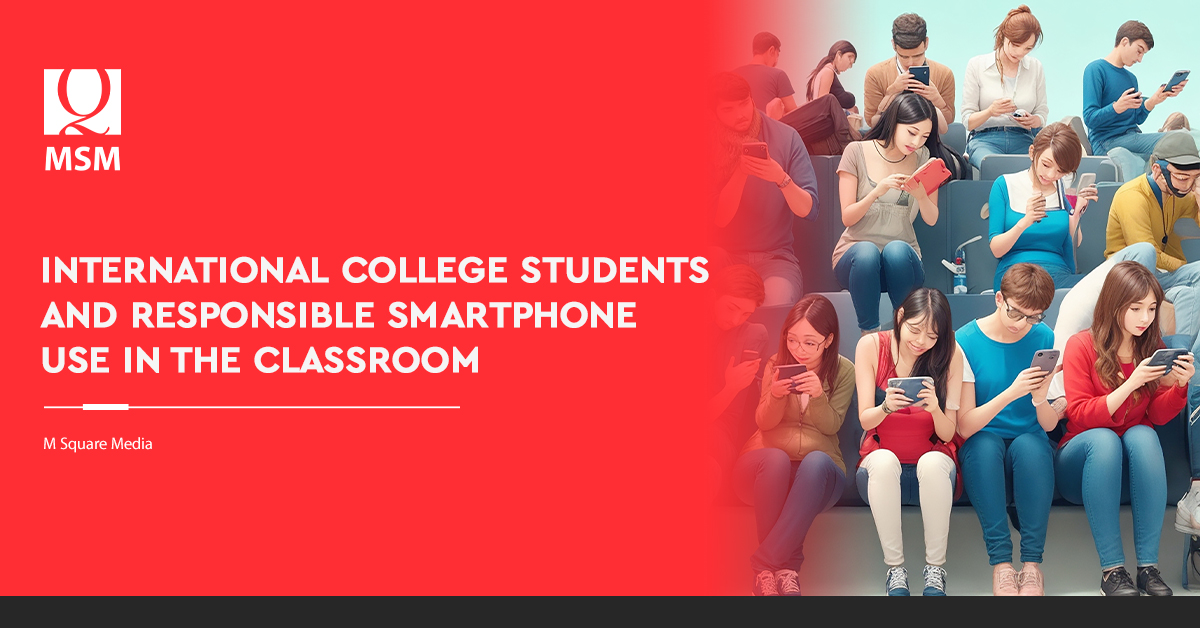Here’s an exploration of the dynamics of smartphone use in college classes, particularly those involving international students. This article also offers helpful advice on how to use a smartphone responsibly while studying at a foreign school.

Smartphones have revolutionized how we gather information, communicate, and carry out numerous jobs. They provide students with a powerful tool for studying and staying connected, which makes their widespread use in college classrooms undeniable. Meanwhile, their use also comes with potential downsides and distractions that can impede learning. International college students need to be particularly mindful of this, as norms and expectations about smartphone use may differ in their home countries.
Navigating Device Usage Within the Classroom as an International Student
College campuses benefit from the different experiences and viewpoints of international students. They bring with them distinctive cultural practices and experiences, such as different expectations for smartphone use. While open smartphone use by students during lectures is common in some cultures, others view it as a distraction or frown upon it.
Guidelines for Responsible Smartphone Use During Classes
Setting Classroom Expectations: Professors play a crucial role in establishing clear guidelines for smartphone use in class. A more inclusive learning environment can be promoted by discussing appropriate smartphone usage during lectures and recognizing the various backgrounds of international students.
Engaging With Educational Apps: Encouraging both local and international students to use educational apps can enhance their learning experiences. These apps can help with note-taking, language learning, and group collaboration. Among these helpful apps are Evernote, a way for students to keep their tasks on track as college students; Google Drive, which allows one to access their files anytime, anywhere, even when using their smartphone; and Grammarly Keyboard, which helps students submit their papers or write emails to their professors.
Silent Mode and Notifications: To reduce distractions, students should put their phones on mute during lectures. In order to keep their attention focused on the course topic, they should also turn off any unnecessary notifications.
Scheduled Breaks: During lengthy lectures, professors can schedule brief breaks so that students can check their smartphones or attend to personal matters. This set period can minimize disturbances while enabling overseas students to stay in contact with their families.
Respecting Cultural Diversity: By discussing and respecting the various cultural conventions surrounding smartphone use, educators can encourage cultural sensitivity in the classroom. Encourage students to engage in open discussions where they can exchange experiences and benefit from one another.
It is crucial to understand that, when used correctly, smartphones can be effective teaching tools. They provide communication, collaboration, and access to a variety of information, which can be beneficial for international college students in their academic endeavors.
Additionally, the COVID-19 pandemic has widened the digital divide in education, making smartphones a necessity for many students, especially those with limited access to traditional computers or internet connections. Smartphones often provide a connection to home countries for international students who are studying abroad, providing emotional support and a sense of connectedness.
Undeniably, there is a need to accept and manage the reality of incorporating cell phones into college classrooms. The diverse backgrounds and experiences of international college students add another level of complexity to this problem. We can make the classroom more inclusive and stimulating for everyone by creating clear rules, promoting the use of educational apps, and respecting cultural diversity.
It’s important to keep in mind that cell phones are not necessarily disruptive as we move forward; it’s how we use them that counts. International students can close the digital divide and make a substantial contribution to the global learning community when they are given the freedom to use their smartphones in ways that improve their educational experience. We can ensure that all students, regardless of their backgrounds, have the resources they need to succeed in the contemporary educational environment by promoting understanding and appropriate smartphone use in college classrooms.
Source:
- Lynch, M. (2023, August 23). Teaching students about smartphones. The Edvocate. Retrieved from https://www.theedadvocate.org/teaching-students-about-smartphones/
- Steele, C. (2023, August 7). Ready for college? Download these essential apps first. PCMag. Retrieved from https://www.pcmag.com/picks/ready-for-college-download-these-essential-apps-first




